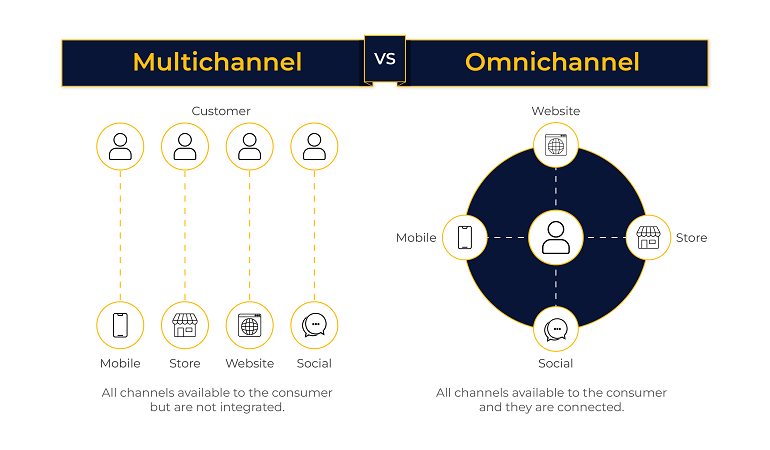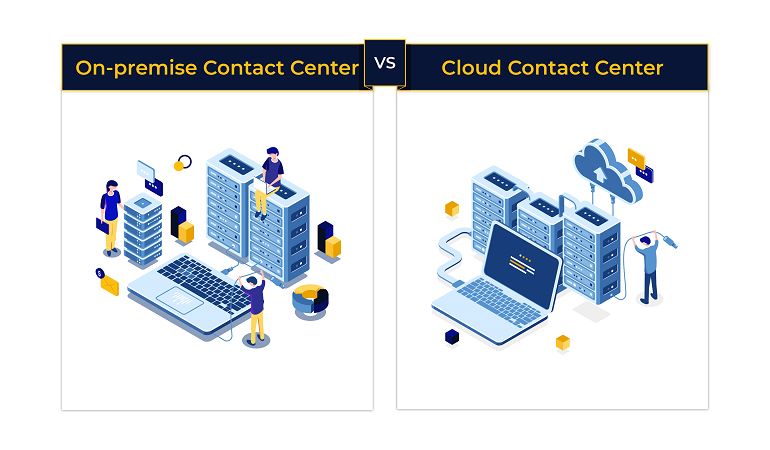
Contact Centers, as the name suggests, are the central point through which an organization manages all its customer interactions. Contact centers allow businesses to offer a better customer experience through their preferred communication channels, whether the phone, social media, or email.
This article explains the major types of Contact Centers and their characteristics. It also offers some valuable tips that can help you identify the type of contact center best suited to your business needs and goals.
Contact centers are categorized based on the following three factors:
- Inbound or Outbound Contact Center
- Multichannel or Omnichannel Contact Center
- On-Prem or Cloud Contact Center
Inbound Contact Centers
An Inbound Contact Center handles real-time incoming calls and messages from customers. It is typically used for customer service and support, like canceling an order or voicing a complaint. When customers call, they are directed to an Interactive Voice Response System, which leads them to an automated message or the desired customer support agent.

Outbound Contact Centers
The main objective of an Outbound Contact Center is to reach out to existing customers or generate new sales leads on behalf of the business. This type of contact center is not as effective as it once was because of the restrictions imposed by the U.S. Federal Trade Commission (FTC). The FTC regulation makes it difficult to contact individuals who opt for the “Do Not Call Registry.”
| Inbound Contact Center | Outbound Contact Center | |
| Purpose | Answer incoming conversations. | Place calls on behalf of the business. |
| Technology | Call monitoring, call controls, ticketing integration, IVR. | Auto dialers, CRM, outbound VR. |
| Agent Skillset | Agents need to be polite and have good problem-solving skills. | Agents need to be good at selling, persuasion, and closing. |
| Business Impact | Measured in terms of customer satisfaction and speed of complaint resolution. | Measured in terms of high conversion rate. |
Multichannel Contact Centers
A Multichannel Contact Center is a platform that enables increased customer outreach via multiple communication channels, such as voice, text, or social media. Customers can contact the business on their preferred channel, leading to improved business efficiency and customer satisfaction.
However, one of the major drawbacks of multichannel contact centers is the difficulty of maintaining the history of communication between channels, which may result in agents having to repeat previously answered questions.

Omnichannel Contact Centers
An Omnichannel Contact Center is also a multichannel contact center that allows agents to support customers across different channels simultaneously. However, there is a vital difference between Omni and multichannel contact centers. The former integrates all channels and focuses on the customer, whereas the latter focuses on the product and its contact channels, which are independent of one another.
In omnichannel, if a customer begins a request online and calls for an update, the agent has access to the previous conversation and continues it from where it was left off. Therefore, omnichannel has now become the new gold standard for customer service. Nevertheless, it requires IT resources for proper execution, making it challenging to opt for new or small businesses.
Comparison
| Multichannel | Omnichannel | |
| Channels | Supports greater customer outreach. | Supports integration of multiple channels. |
| Agent Experience | Agents might need to respond to the same queries. | Agents have access to chat histories. |
| Customer Experience | Customers can choose the communication channel of their choice. | Customers can continue the same interaction using different channels. |
| Technology | Separate technology for each channel. | Unified views and dashboard, usually on the cloud. |
On-Premises Contact Centers
These are contact centers managed by an in-house IT team, i.e., all the hardware and software are managed by on-site resources. On-premises centers are preferred because they offer high-level security. However, designing and upgrading your solution entails a higher cost. Moreover, its maintenance cost is also high.

Cloud Contact Centers
A cloud-based contact center is an alternative to an on-premises contact center. It is hosted on your chosen cloud service provider’s site, so you do not need to manage the infrastructure costs. Thus, your teams can work remotely to provide excellent customer service using the software platform.
| On-Prem | Cloud Contact Center | |
| Setup | Increased first-time setup and installation costs. | Easy, cost-effective & quick deployment. |
| Equipment | On-Site | On-Cloud |
| Scalability | Additional costs for hardware and feature upgrades. | No hardware costs, upgrades, and new features are included. |
| Integrations | Limited and time-consuming integrations. | Scalable integrations & flexible solutions. |
| Flexibility | No scope for working remotely. | Scope for working remotely. |
Tips for Choosing the Right Contact Centers
To identify which contact center is right for your organization, consider the following five main tips.
- Verify you have the right resources to handle customer service
Consider your current resources’ skillset and provide them with the training agents might need to get maximum business benefits.
- Listen to your customers
Conduct in-depth market research and interview current customers to ascertain the communication channels they prefer. You can then integrate their preferred channel(s).
- Analyze business costs
As with any business decision, costs should be high on your list of concerns. Make sure to analyze the costs before moving forward. This includes scaling and platform costs.
- Choose the right technology
Determine the CRM and integrations needed to support your organization regardless of communication channels, and choose the contact center accordingly.
- Secure your business and customer information
Make sure that your customer information is safe by prioritizing security and privacy.
Summing it up
Contact centers are an essential part of many modern-day businesses. They ensure higher customer satisfaction and thus ensure customer retention. Moreover, contact centers add to your business reputation by providing enhanced customer experiences.
Therefore, choosing the right contact center is vital for your business’s growth and prosperity. On the other hand, failure to do so will cost your business. We hope this article equips you with the necessary information for making an informed decision regarding contact centers.
If you need any further assistance in choosing the type of contact center for your company, feel free to contact us at [email protected].
